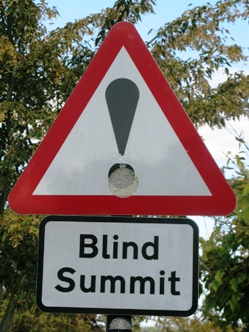
We’re the ones we have to worry about, says Ted Nield
Geoscientist 20.2 February 2010
I have spent at least part of my career practising the dark arts of persuasion, and if I can say one thing with some authority, it is that cases are not strengthened by being overdone. In a way, this derives from an even more basic rule of advocacy, public relations and advertising – namely never, but
never, lie. Alas, such strict adherence to defensibility and truth in language is not a discipline that is universally to be found among those slack-jawed pop-takers who on occasion set themselves up as spokespeople for science.
The first and most grievous lie that such people tend to tell, is told straight to politicians’ faces - in evidence to Parliament or committees of enquiry - in the simple phrase “The Government
must”. What makes this suicidal is that all governments know One Big Thing – and it is that they simply don’t do “must”. They are in charge, and nobody is going to tell them that they “must” anything, thank you. A submission that opens with this phrase, therefore, is doomed.
The second kind of lie consists of foolish and hysterical overstatement. The best place to see examples of this is in letters to newspapers. One such, signed by the aptly named Professor Billowes of Manchester (and about a score of his aerated colleagues) appeared recently in
The Times (16 December 2009) bemoaning a lower-than-expected budget allocation to the Science & Technology Facilities Council (STFC). The letter’s final paragraph opened: “The academic nuclear physics community’s contribution to UK plc cannot be overestimated.” What poppycock. “
Should not be underestimated” might be justified. But it should not need a lawyer (or any other professional wordsmith) to explain to a scientist that nothing “cannot be overestimated”.
And so we come to Copenhagen, which had just reached its feeble conclusion as I write this. In the annals of the uncertainties of estimation, it took some beating. As a spectacle of governments facing (or not facing) an issue where they really “must” do something (because even politics must concede
force majeure to nature) it was almost unrivalled. And in all my born days of witnessing the careless use of words by those claiming to be on the side of science, it came out as top banana
assoluta.
Part of what makes climate agreements so hard to reach is the unacknowledged fact that politicians are by their very nature unwilling to recognise
force majeure when they see it. As the scientists who see it more clearly than anyone, geologists “must” take care to speak carefully - or risk being ignored. For they, surely, know that whatever happens to the climate, the planet will do just fine. It has, after all, suffered worse.
Moreover it might help politicians to grasp this issue if it can be stated that the brouhaha is not about the future of a shared cosmic entity with no vote (“the planet”). Environmentalism is best portrayed not as altruism directed at mother Earth, who is (as geologists know) a most unsuitable parent. Environmentalism is simply, and wonderfully straightforwardly,
selfishness. It’s about our own convenience. It’s all about us.